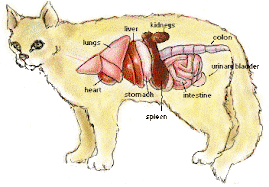When it comes to heartworm disease, dogs and cats have a lot in common. But new research shows that in cats there is the potential for more severe reactions and even sudden death. Indoor cats are also at risk for heartworm disease. Cats get heartworm disease the same way dogs get it. Mosquitoes transmit the disease by biting an infected animal, then passing the infection on to other animals they bite.
Cases of heartworm disease in cats have been reported across the United States and many other countries. Heartworm disease is most common in areas where dogs are also at risk.
What are the signs?The most common signs of heartworm disease in cats - coughing , vomiting, breathing difficulties, weight loss, and lethargy - are often mistaken for other conditions such as asthma, pneumonia and digestive problems. In fact, most common clinical signs of heartworm disease in cats resembles bronchial asthma.
PreventionOnce a cat is diagnosed with heartworm disease, managing the disease can be difficult. Treatment, as well as non-treatment, is very risky, because there's currently no approved product for treating adult heartworms, and the onset of clinical signs is impossible to predict in cats that are left untreated. Even if the disease is treated, your cat may experience severe complications or even death when the worms die. Prevention is the best medicine. Ask your veterinarian about heartworm disease prevention for your cat. It will help give your feline friend the best chance for a long and healthy life.
Monday, October 8, 2007
HEARTWORM IN YOUR CAT
Posted by
THE ALLEY CAT FORUM
at
9:56 PM
![]()
Labels: BLACKWHITE CAT, CAT DISEASE, CAT HEALTH, CAT VETERINARIAN, CATS, HEARTWORM, HEARTWORMS, MOSQUITOES, SICK CAT



















 Custom
Custom 

